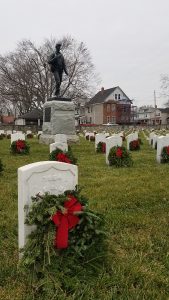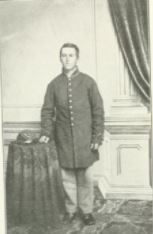Reflecting On The Theme: “Find A Way To Serve”

Last week Emerging Civil War announced a special fundraiser to help donate funds to help Wreaths Across America place more wreaths in Winchester National Cemetery. Since I’m one of the editors working on research and getting ready to present at our special virtual fundraiser evening (October 5, 2022), I’ve been doing my homework!
Early this year, Wreaths Across America announced their theme: “Find A Way To Serve.” In case you’re not familiar with this group… “Wreaths Across America is a 501(c)(3) nonprofit organization founded to continue and expand the annual wreath-laying ceremony at Arlington National Cemetery begun by Maine businessman Morrill Worcester in 1992. The organization’s mission – Remember, Honor, Teach – is carried out in part each year by coordinating wreath-laying ceremonies in December at Arlington, as well as at thousands of veterans’ cemeteries and other locations in all 50 states and beyond.” (More on their website!)
The theme chosen for 2022 has large meaning in the modern context, and I appreciate that. But, naturally, I’ve also been thinking of the phrase “find a way to serve” in the context of the Civil War soldier. The words echo some of the writings in soldiers’ letters, and Charles Lynch’s diary came to mind.

Lynch’s diary (published in 1915) is one of my favorite, published “common soldier” resources connected to the Shenandoah Valley. I’ve written about his medical care, swimming adventures, and his version of the attack on Star Fort previously on the blog. Lynch enlisted and fought in the 18th Connecticut Infantry, and most of his war service was in the Shenandoah Valley region. He survived the war and is NOT buried in Winchester National Cemetery, so he won’t be a featured soldier in the upcoming virtual program. However, I’ve been referencing his diary this past week for another project and also to refresh my memory on his regiment’s experiences.
There are a few poignant phrases that Lynch uses consistently throughout the years of his journaling that became particularly relevant in the spotlight of Wreath Across America’s theme. Lynch uses the word “serve” only a few times and usually in reference to getting a meal. One exception is in his March 4, 1864, entry which reads:
Received a number of letters from friends at home. Snow has disappeared. While the weather is fine, the mud is very sticky and plenty of it. A large quantity will stick to one’s feet, or rather to our army brogans, as we attempt to walk in it. This all comes in the life of a soldier. We are not serving our country for pleasure. We are very anxious to have the war stop. We are not in love with the life but the war must be stopped right, so that we can have a free country.
Lynch’s written moments of reflection on his military service usually came in moments of hardship. He tended to either grimly accept the situation or, like this previous example, look for a reminder about why he was willing to endure a deprivation or difficulty.
While “serve” or “service” is not a particularly common word in Lynch’s writings, the phrase “for our country” is used more frequently. “Suffer” or “suffering” is also more common and at times can be seen as a synonym for “serve.” Here are a few examples.
During Hunter’s Campaign in the Shenandoah Valley during June 1864, Lynch wrote: “We are soldiers, doing hard service for our country in a cruel war, but for all that we cannot help but take in the fine scenery.” (June 6, 1864) A few days later: “The loss of our good boys brings us many sad hours. We cannot help think[ing], and wonder who will be the next one to give his life for our country.” (June 8, 1864) After Hunter’s retreat from Lynchburg, the Union army fell back through mountainous country. By June 23, 1864, Lynch had perspective, saying, “While we are all tired, foot-sore, and near used up, there is but little growling or fault-finding. Keep up courage very well as we endure these hardships, all for our country.” About a month later, Lynch was back in the Shenandoah Valley and had literally marched through his shoes and stockings. Barefoot, he hobbled and fought his way toward a location known as Bunker Hill. That night he wrote: “I am in agony with my feet. We are in a ragged, dirty condition. The life of a soldier is a hard one. Our suffering at times is intense. It’s all for our country that we all love.” (July 24, 1864)
In Lynch’s war writings, hardship was part of his service. He seemed to accept it as part of the cost of reuniting the country he loved. At times, his journal feels like the place he wrote to remind himself what he believed—almost as if he had to convince himself so that he would stay in the ranks and likely encourage others.
Charles Lynch found a way to serve, and he found meaning in that service. Still, he daily confronted the price that he might pay to serve his country. He saw comrades killed and wounded; sometimes, he went to try to find or help them after the battles ended. The cost weighed heavily on his mind, particularly during in March 1864 furlough. At home in Norwich, Connecticut, Lynch wrote solemnly:
“It is good to be home once more among friends. Wishing the war was over. I am afraid that many more of the 18th Regiment must fall before the end comes. Some will never see home again. These are dark, sad days, but we are trying to enjoy our visit at home, visiting relations and friends. The cemeteries in the cities and the country show that many young fellows have given their lives for our country.” (March 31, 1864)
Lynch survived, but many of his comrades did not. Some of the fallen were sent home to be buried in local graveyards. Others were hastily covered and interred on the battlefields or in local churchyards near where they died. Some of the Connecticut soldiers’ remains would later be moved to Winchester National Cemetery, and some of the survivors of the 18th Connecticut regiment would place a monument at that location.
The diary that Lynch chose to publish gives glimpses into his mindset as a Union soldier fighting through campaigns in the Shenandoah Valley. How he endured the military hardships. What meaning he gave to those difficulties and losses. Like thousands of others—everyday of his military service—he found a way to serve.
With Lynch’s writings in mind, I’m sorting through records of soldiers who paid the ultimate price of service in the Shenandoah Valley during the American Civil War. The records and the stories of soldiers buried in Winchester National Cemetery. I’m hoping that the opportunity to share some of their accounts will open a modern chance to “find a way to serve.” Remembering their stories, saying their names, and placing a visual reminder that we chose to honor their lives and sacrifices creates a meaningful moment.
Please consider supporting Emerging Civil War’s fundraiser to help Wreaths Across America place more wreaths at Winchester National Cemetery. A donation of $15 covers the cost of one additional wreath and all donations go directly to Wreaths Across America. When you donate through Emerging Civil War’s fundraiser page, your name and email are added to our guest list for the exclusive virtual history program which will be hosted on October 5, 2022 at 7pm. You’ll be able to join us for a history presentation and an interactive time as a thank-you for your support. (We’ll send you the link closer to the event date.)
To learn more about this event, please check out the press release here: https://emergingcivilwar.com/2022/08/31/emerging-civil-war-hosts-fundraiser-for-wreaths-across-america/
To make a donation and be able to join the virtual history program, please visit: https://bit.ly/ECW2022Wreaths
Based on his diary entries, Lynch “played the long game,” serving his country as long as it took to help save the United States. Good post!